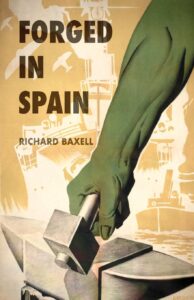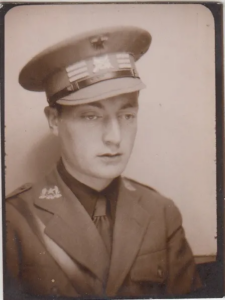Book Review: Ten Biographies by Richard Baxell
 Forged in Spain, by Richard Baxell. London: The Clapton Press, 2023. 412pp.
Forged in Spain, by Richard Baxell. London: The Clapton Press, 2023. 412pp.
The body of a mysterious man washes up on a southern British beach near Brighton in 1963. It carries no identification and even the clothes labels have been cut out. The only clue is a monogrammed white pocket handkerchief bearing the initials “MD.” Police eventually discover that this is the corpse of Malcolm Dunbar, a former International Brigades officer in Spain who once had been described in the British parliament as “‘the man who threw 150,000 men across the River Ebro.”
In this excellent collection of ten short biographies of International Brigaders and other foreigners drawn to the Spanish Civil War, Richard Baxell starts with the Dunbar mystery. Has he been murdered? Did he commit suicide? Is his death related to the unmasking of the infamous Cambridge spy ring, in which apparently impeccable members of the British upper class doubled as Soviet spies? “Many people, including members of his family, strongly believed that Dunbar, a Communist and confidant of the notorious Soviet double-agent, Kim Philby, was actually murdered and his death arranged to look like suicide,” Baxell notes. The coroner declined to describe his death as suicide, giving an open verdict.
The cloak-and-dagger world of Cold War spying drew in a number of veterans of the International Brigades. The handsome and enigmatic Dunbar—who shared the upper class background, private schooling, and university education of the Cambridge spies—may, or may not, have been one of them. He was a ballet-loving introvert who first gained respect as head of the British battalion’s anti-tank unit. His calm leadership and survival of several battlefield wounds saw him promoted rapidly to major. Abraham Lincoln Battalion commander Milton Wolff rated Dunbar as one of the two best soldiers in the XV International Brigade and he would be just one of five British volunteers to receive a signed goodbye note from La Pasionaria.
Despite having more battlefield experience than almost anyone else in Britain, Dunbar’s role in the Second World War was initially discreet. International Brigaders were not welcome in the British army. “The presence of such men in the Army would obviously be highly undesirable,” a military report stated. The former major joined the signals corps as a private and was kept in England for much of the war. When he finally crossed into France in 1944, he soon won the military medal and was described as “a really high-class soldier having initiative, poise and perfect honesty… he is a highly efficient and educated man whose qualifications have not been made full use of.”
After the war, now as a member of the Communist Party, he struggled to make sense of life. He worked for the Labour Party and for trade unions but ended up a penniless drunk. Before his corpse washed up on the beach, he had made previous attempts at suicide. Like many brigaders, then, it seems that Dunbar never found anything to match his intense experiences in Spain. In Baxell’s biographies, Spain often carries a similar charge—as an experience that is formative, overwhelming, or life-changing.
Baxell has already written the definitive account of the International Brigaders from the United Kingdom in Unlikely Warriors, which is also one of the best scholarly studies of the brigades as a whole. Yet all historians of the International Brigades are faced with massive lacunae of information, in part because most IB veterans followed the example of the composer and Republican commander Gustavo Durán, whose poet daughter Jane Durán wrote: “He lays down his arms. / He raises his arms over his head. / He will not tell.”
By unlocking Dunbar’s story, Baxell fills in one of the larger gaps. Several of his other subjects are also brigade veterans about whom we knew too little. They include Peter Kerrigan, a tough Glaswegian political commissar who became a leading British communist; the painter Clive Branson; and surgeon Alexander Tudor Hart. Stafford Cottman, who joined the POUM along with George Orwell, is another person about whom we did not know enough.
Political militancy helped some overcome the traumas of war and its aftermath, but not always fully. Kerrigan suffered post-traumatic stress disorder, “a hidden psychological scar to accompany the sudden greying of his hair.” Stafford Cottman shared Orwell’s disillusionment with the Communist Party, famously described in the latter’s Homage to Catalonia.
Baxell avoids the temptation to paint his subjects as saints. The Communist Party and the Soviet regime are rarely far away. Tudor Hart was at one time married to Edith Suschitzky, considered by Baxell to be “one of the most influential Soviet agents to operate in Britain during the twentieth century.” At Jarama, Tudor-Hart drove his team hard and angered many with his high-handed manner. They worked 14-hour shifts like “cogs in a machine, working in a frenzy, and dropping down to sleep whenever there was a chance.” Unwilling to take breaks, he shocked fellow doctors by urinating into a bucket in the middle of an operation and sometimes fell asleep underneath the operating table. Baxell shares the assessment of a colleague who said Tudor Hart did “magnificent work” but “was a very difficult person to work with.“ His wife was eventually interviewed by MI5 agents. “She was completely composed and answered questions in the manner of a person well trained to resist an interrogation,” they reported. “It remains unclear how much Alex Tudor Hart was aware of his ex-wife’s espionage activities and there have long been suspicions that he knew more than he was letting on,” Baxell adds. Tudor was eventually expelled from the Party for “Maoism.”
Alex Foote, who also fell out with the CP, was a less glamorous presence in Spain, where he worked as a driver before embarking on a colourful life as a Soviet agent. He spent much of World War II as a secret radio operator in Switzerland, where the Rote Drei (Red Three) spy ring provided crucial intelligence on the Wehrmacht. Foote was decorated four times by the Soviets but rapidly turned away from communism after the war, publishing A Handbook for Spies, which was ghost-written by someone at MI6. When British intelligence declined to hire him, Foote also took to the booze.
Branson, some of whose pictures are held by London’s Tate museum, was captured in Spain, spending time in the notorious prison camp at San Pedro de Cardeña. He would likely have become more famous but was killed fighting in the British Army in Burma in 1944.
Other Baxell subjects are better-known—perhaps none so much as the Haldane family headed by scientist JBS Haldane, although their Spanish stories (including those of his writer wife Charlotte and International-Brigader son Ronnie) have not been told as a family drama before. Leah Manning was instrumental in the evacuation and care of the many Basque children who spent the civil war as refugees in Britain. She went on to become a Labour MP. Peter Kemp, a volunteer on Franco’s side, provides an interesting counterweight to the IB volunteers and leftists—though his is more a story of adventure than of politics, passion or ideology.
Manassah ‘Sam’ Lesser was wounded in Spain early in the war but returned as a reporter for the Communist Daily Worker. His ensuing career as a foreign correspondent, in Baxell’s words, “gave him a ringside seat at many of the most dramatic events of the twentieth century.” Lesser was later sent to Moscow but fell out of love with Russia. “In the past, the Party had tried to give the impression that it was a bloody paradise, which it most certainly was not,” he told Kerrigan. The Prague spring finally turned him off Soviet communism though he remained firmly left-wing and eventually chaired the International Brigades Memorial Trust in the United Kingdom. In 2009, he was one of seven elderly British veterans awarded Spanish passports as a symbol of Spanish thanks to the brigaders. Baxell reproduces part of Lesser’s thank you speech, delivered in Spanish: “Hemos tardado un poco, pero creo que hoy podemos decir que hemos llegado a casa.” (“We are a little late, but I believe that today we can say that we have come home.”)
Baxell’s book, published at a moment when most of those who experienced the civil war in Spain have died, provides a valuable, entertaining home for the memory of some exceptional individuals. It is also a resource for those interested not just in the war, but in the amazing lives of those who travelled to Spain to take part in it.
Giles Tremlett is a prize-winning writer and journalist based in Madrid. Among his recent books are The International Brigades and España, A Brief History of Spain.













